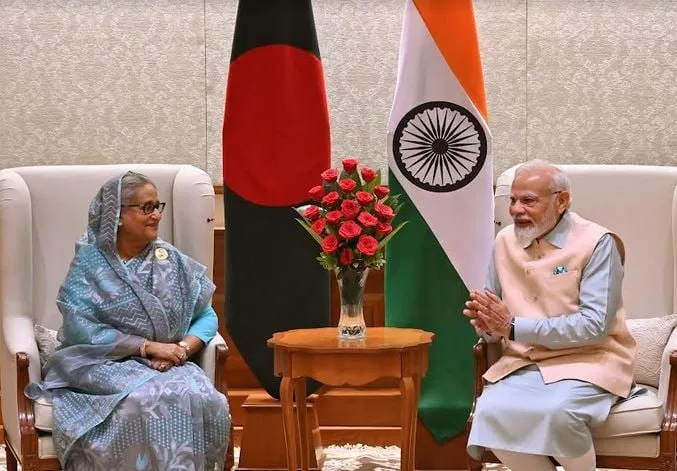Arafatul Islam :
Bangladesh’s Prime Minister Sheikh Hasina secured a fourth consecutive term in power earlier this year, with her Awami League party taking three-quarters of seats in parliament following what some observers regard as a controversial election.
The vote was conducted by keeping almost all top leaders of the main opposition party and over 25,000 of its activists behind bars who were arrested in the run-up to the election on various charges — including arson attacks and vandalism — that some independent observers think were politically motivated.
However, Bangladesh’s neighbor, India, welcomed the election result, with Indian Prime Minister Narendra Modi congratulating Sheikh Hasina on her victory.
“We are committed to further strengthen our enduring and people-centric partnership with Bangladesh,” Modi wrote on X, formerly Twitter, after the result was announced.
India shares a 4,100-kilometer-long (2,500-mile) border with Bangladesh. Bilateral trade between the countries exceeded $15 billion (€13.71 billion) in 2021-22.
‘India out’ campaign gains traction
A group of Bangladeshi influencers and political activists launched an “India out” campaign after the January elections, claiming that the Modi government has not only been ignoring its neighbor’s democratic backsliding but also actively backing Sheikh Hasina to stay in power for its own self-interest.
Pinaki Bhattacharya, an exiled Bangladeshi physician and influential social media activist living in Paris, announced the latest “India out” campaign in mid-January by urging his millions of followers not to buy Indian products in Bangladesh and abroad to protest against “India’s relentless meddling in Bangladesh’s domestic affairs.”
“A striking example of such interference was the mockery of democracy seen in the January 7 elections, where India’s involvement was pivotal in upholding a regime that blatantly favors India’s strategic, political, and economic agendas,” Bhattacharya, a PM Hasina critic, told DW.
The campaign has received support in Bangladesh on social media, with reports suggesting that some people are favoring alternatives to Indian products in Bangladesh and abroad.
Strong neighborly relations
Some experts have doubts about the effectiveness of such a campaign as the relationship between the two countries is so deeply entrenched, and Bangladesh has become so dependent on India that achieving a complete boycott of India is unlikely.
Ali Riaz, a political science professor at Illinois State University, thinks that there is a political message underpinning this campaign that has implications beyond immediate success.
“The campaign reflects the simmering discontent about India’s disregard to the legitimate grievances of Bangladesh and its role in Bangladesh’s domestic politics,” Riaz told DW.
According to the expert, the perception that India has helped Bangladeshi PM Sheikh Hasina remain in power despite her country’s democratic backslide and poor human rights records, which were condemned by the West, is not unfounded.
“This is not the first time that India came to the aid of the Hasina government, during two previous elections in 2014 and 2018, which were marred by massive vote rigging in favor of the ruling party and boycotts, India stood by Hasina,” Riaz added.
The Bangladeshi government denies these allegations.
Mohammad A. Arafat, a lawmaker from Bangladesh’s ruling Awami League party, doesn’t consider the ”India out” campaign as an issue that needs to be addressed.
Arafat said that the United States, on the other hand, has tried to interfere in his country’s domestic affairs by announcing visa restrictions last year to Bangladeshi citizens who undermine elections.
“The US embassy in Dhaka showed keen interest in the elections and conducted several meetings in several locations, including the election commission. India hasn’t done any such things,” he told DW.
The US said Bangladesh’s general election in January was not free and fair. However, it didn’t announce any new punitive measures in response to the election irregularities.
Both Bhattacharya and Riaz claim that New Delhi used its diplomatic leverage to contain the US from taking stricter action against Bangladesh over the issues of democracy and human rights. Washington denies the allegations of interference in Bangladesh’s domestic politics.
How does India view the campaign?
Maldives President Mohamed Muizzu has promised to shift his country away from India in a region where New Delhi and Beijing vie for influence.
As an opposition leader, Muizzu demanded the removal of Indian military personnel stationed in some Maldivian islands.
At least 75 Indian military personnel are believed to be in the Maldives and their known activities include transporting patients from remote islands and rescuing people at sea.
India’s External Affairs Minister S Jaishankar said that his country is not concerned about the “India out” campaigns.
“There are two realities we must recognize. China is also a neighboring country and in many ways will, as part of competitive politics, influence these countries [Maldives, Sri Lanka, and Bangladesh],” he said at an event in Mumbai on January 30.
Shantanu Mukherjee, a former officer with the Indian Police Service (IPS) and Bangladesh expert based in India’s capital New Delhi, thinks there are some “anti-India forces in Bangladesh but they are small in number.”
“Those anti-Indians are a minority in Bangladesh. They don’t want the relations between Bangladesh and India to become sweeter,” he told DW, adding: “The more the relations will become warmer, their anti-India campaign will go further.”
Pinaki Bhattacharya said that the “India out” campaign harbors ”no animosity towards the people of India.”
“It is a vehement political fight aimed squarely at the governing elite of India, a relentless battle to reclaim the sovereignty and stewardship of our cherished motherland,” he said.
Source : dw

